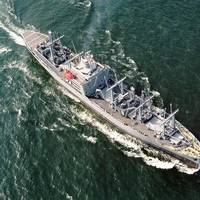Impact of Dredging on Maritime Law

In 1875, the General Moultrie was the first suction dredge built in the United States and was used in the Charleston River — until it sank within a year. During the same era, the city of Houston and other port towns formed companies like the Buffalo Bayou Ship Channel Company to build special-purpose vessels to clear and connect waterways for commercial vessel traffic. Toward the end of the 19th century, the cutter suction dredge made its appearance and effectively dug and maintained water channels.
Catching a Jones Act Seaman’s 'Golden Parachute'

A challenging offshore environment produces a different but equally difficult development. Will you be ready when it comes to your fleet? Unfortunately, our industry continues to suffer due to the depressed oil prices that started in 2014. When the price of oil initially dropped, the industry’s outlook remained positive, and I remember hearing the mantra: “Stay lean for 2015.” Everyone thought that oil prices would rebound in short order and that we were only weathering a short downturn.
For Payroll Purposes, is Your Seaman Really a Seaman?

For operational purposes, it is critical to know what type of employees you have on your vessel. Failure to do so could be expensive. As vessel operators, we pay close attention the provisions of the Jones Act and how they affect the operation, crewing and administration of our marine-based operations. A determination that your vessel-based crews are seamen under maritime law creates a different employment relationship when compared to employees designated as longshoremen or land-based employees.
US$2-Million Jones Act Settlement for Seaman

Houston-based maritime law firm Schechter, McElwee, Shaffer & Harris recently obtained what is believed to be one of the largest settlements paid by the United States to a Jones Act seaman. According to court documents, their client, a 58-year-old seaman was working aboard the S.S. Cape Jacob, a military supply ship owned by the United States and operated by private contractor Matson Navigation, Inc.The vessel was docking in the port of Jangu, South Korea, on Aug. 2, 2010, when the man alleged that he was ordered to secure mooring lines to the dock.
Congress Should Enhance OPA 90 Responder Provisions
The Benefits to the Scope of Coverage in an Expanded Responder Immunity Regime are many. The response industry has been extremely supportive of a coalition effort to work with Congress to enact enhancements to the current responder immunity provisions enacted by the Oil Pollution Act of 1990 (“OPA 90”). Unfortunately, however, Congress has not taken immediate action following the Deepwater Horizon incident, which occurred almost 3.5 years ago, like it did following the Exxon Valdez incident in 1989 to enact legislation to remedy deficiencies identified as a result of the incident. Congress acted in approximately 18 months following the Exxon Valdez incident.
Seaman or Longshoreman: The Zone of Uncertainty

Historically in our industry, there has been a clear dichotomy between companies whose employees are seamen that are covered by the Jones Act and those that are longshoremen and covered by the Longshore and Harbor Workers’ Compensation Act (LHWCA). The difference was very simple, Jones Act employers and their seamen were responsible for vessel-based duties and operations. Longshore employers hired longshoremen that were land-based although they performed a portion of their duties aboard vessels.
Diver Down!!! An Exception to the General Test for Seaman Status?
By James P. Nader & Joseph A. Once again we take that familiar voyage know as "determining seaman status." No matter how familiar the voyage there are always changes in the currents which guide your path. Seaman status is important because only a seaman may receive maintenance and cure, and pursue a claim for Jones Act negligence or unseaworthiness. The basic requirements for seaman status are well established in maritime law. In order to qualify as a seaman under the Jones Act, a person's employment duties must contribute to the mission of the vessel and be connected to an identifiable group of vessels in navigation. The United States Supreme Court has held that seaman status should be determined by the specific facts of each case.
How to Indentify a Jones Act Seaman
By Jeffrey S. The maritime law community is awaiting the next pronouncement by the U.S. Supreme Court pertaining to the definition of a Jones Act seaman. In February, the high court announced that it would review the decision of the First Circuit Court of Appeals in Stewart v. Dutra Construction Co., Inc. The definition of seaman has proven to be a nagging problem; this will be the fifth time since 1991 that the Justices have tackled some aspect of the question. Most injured maritime workers would prefer to pursue recovery as a "seaman". There are several reasons for this. First and foremost, the damages recoverable under the Jones Act are not limited to lost wages and benefits, but also include an important component for "pain and suffering".
Jones Act Seaman May Not Recover Nonpecuniary Damages from Third Party
The U.S. Court of Appeals for the Fifth Circuit ruled that a Jones Act seaman or his survivors cannot recover nonpecuniary damages from a non-employer third party. In the instant case, a seaman contracted (and eventually died from) silicosis while working as a sandblaster maintaining protective coatings on offshore oil platforms. Plaintiff seaman worked on vessels owned by defendant shipowner and wore allegedly defective hoods manufactured by defendant shoreside companies. The trial court held that plaintiff seaman (and then his survivors) were not entitled to recover nonpecuniary damages in the wrongful death suit against the shoreside manufacturers. Plaintiff survivors appealed.
An Exception to the Divers' Exception?
By James P. Nader & Rudolph F. An occupational study estimates that the number of commercial diving positions nationwide will grow to an anticipated total of 5,000 positions over the next decade. For the uninitiated, the focus of these commercial divers spans the gamut from extensive inspection of hulls and pipelines to the construction and repair of underwater structures to the demolition and removal of underwater obstacles, and onwards to the search and rescue of people and missing objects. While the commercial diving industry is certainly diverse, every diver shares a certain level of risk of injury when entering the water. Therefore…
Odds are Improving for Riverboat Casino Employees Seeking Jones Act Seaman Status
In 1991, casinos were legalized in the state of Louisiana through the passage of the Louisiana Gaming Act. Riverboat casinos have been operational in the state since 1993. The Louisiana Gaming Act allows for fifteen riverboat licenses with mandatory Coast Guard certification of the vessels. The Act allows for both dockside and riverboat gaming. Five other states have riverboat casino gambling: Iowa, Illinois, Indiana, Missouri and Mississippi. Although riverboat gaming has gained legal recognition in these states, riverboat casino employees have not had the same success in gaining seaman status under the Jones Act. The Jones Act (46 U.S.C. sec.
Engineer in Dredge is Jones Act Seaman
The U.S. Court of Appeals for the First Circuit ruled that an engineer employed on a dredge in navigation is a seaman for purposes of the Jones Act. This decision was rendered when the court’s earlier decision was reversed and remanded by the U.S. Supreme Court. Stewart v. Dutra Construction Company, Inc., No. 99-1487 (1st Cir., August 9, 2005).
Plaintiffs Cannot Be Seamen When Not Sail in Navigable Waters
In Solomon v. Blue Chip Casino, Inc., 2002 WL 1763935 (Ind.App. July 31, 2002), the court found the casino boat worker plaintiffs (a slot representative and a table games specialist) could not pursue Jones Act seaman claims against the vessel owner when the section of Trail Creek upon which the casino boat is moored in not "navigable in fact." The boat was situated in a "small, man-made, rectangular area of water that was dug out of dry land connected to Trail Creek by a narrow and shallow opening." The court found that while shallower draft recreational vessels may be able to, a commercial vessel such as the casino boat could not transit this two and a half feet deep section of Trail Creek out to Lake Michigan.
Legal Beat: Captains Not Able to Recover Under Jones Act
Maritime law traditionally recognized only two claims by a seaman injured in the course of his employment. One claim was for maintenance and cure along with wages until the end of the voyage, and the other claim was damages for injuries sustained due to the unseaworthiness of the ship. Eventually, the Jones Act was passed creating an additional right of action for seaman under the theory of negligence. In contrast to the rights afforded to seamen, vessel owners have also been provided with certain defenses and immunities. One such defense is the primary duty doctrine. Under the primary duty doctrine, a Jones Act seaman may not recover from a vessel owner for injuries caused by the seaman's own failure to perform a duty imposed on him by his employment.
Legal: Seaman's Failure To Disclose Prior Injuries Forfeits Right To Maintenance & Cure Benefits
Maintenance and Cure is the obligation of a ship owner who employs seamen to care for them in the event that they are injured or become ill during their service to the vessel. This duty can be traced back to medieval maritime law. What is maintenance and cure? Maintenance is the right of a seaman to food and lodging if he falls ill or becomes injured while in the service of his vessel. Cure is the right to necessary medical services. The duty of the Jones Act employer to pay maintenance and cure is triggered when the seaman falls ill or is injured regardless of fault. A claim for maintenance and cure may be asserted by anyone who is a Jones Act seaman. To be eligible the seaman must be acting in the service of his vessel at the time of the illness or injury.







